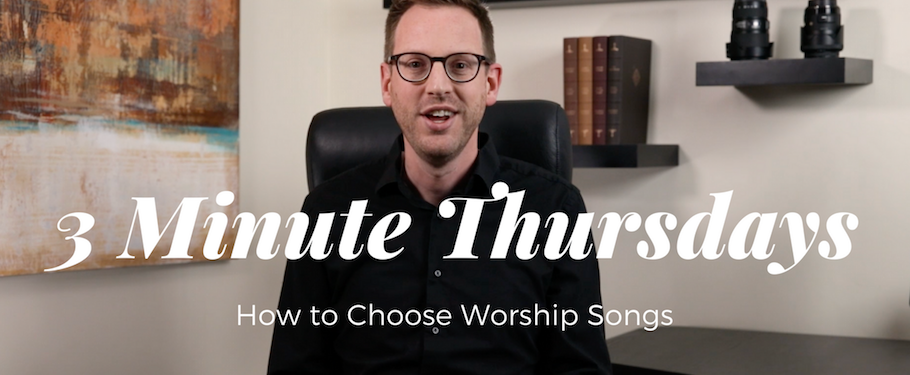Welcome to another edition of 3 Minute Thursdays. You know how it works by now: We put three minutes on the clock and in that brief amount of time I do my best to say something helpful, maybe even useful about a subject that’s of interest to people like you. Today I want to talk about church music, and specifically about how to choose music for church.
Transcript
Welcome to another edition of 3 Minute Thursdays. You know how it works by now. We put three minutes on the clock and in that brief amount of time I do my best to say something helpful, maybe even useful about a subject that’s of interest to people like you. Today I want to talk about music. I want to talk about church music. I want to talk specifically about how to choose music for church, right. Does that sound like a good topic? We’ll get three minutes on the clock and we’ll go for it in just one minute.
Today we’re talking music, we’re talking church music. We’re talking about how to choose songs for your church that will be helpful to the congregation. So, we’ll get three minutes on the clock, and let’s do this.
The very first thing I want to say is to choose songs that are theologically sound. Now, we have to be careful here. We don’t necessarily mean theologically dense. Not every song has to be absolutely jam-packed with truth. But it does have to be true. Which means it can’t be full of air. So we need to carefully evaluate songs to ensure they are fundamentally true. But there is a place for simple songs. I was just reflecting earlier on Psalm 117, all of two verses. Psalm 118, which is what, 29 verses or something maybe. All the way to Psalm 119, which goes on and on, it’s a huge thing. There’s a psalter, and so back in the day, people were singing those short, all the way to very long songs. And we can learn from that. We can sing short, we can sing long. What matters is the truth. What matters is that they contain sound doctrine.
The second thing is to choose songs that are congregational. What I mean is, there’s songs that are meant to be sung by a group of people. Over the last few years, we’ve really started to choose our songs based on what we hear on Christian radio, or on Christian albums. And that’s not to say those songs are bad or there’s anything wrong with them, but congregational singing really requires congregational songs. So we should really be thinking about songs; are they singable by a group, are they singable by amateur musicians, by people who probably don’t sing for a living, probably don’t know a lot about music. The beauty of hymnody is not just the content of the songs, but it’s the fact that they’re so, so singable. Just about anyone can sing Amazing Grace and pick it up almost immediately. And many of the old hymns are like that. So, let’s go back, as a church, to singing songs that are singable by a group. We don’t have to sing songs that are popular. We don’t have to sing those musical styles. Let’s choose songs that are truly, genuinely singable.
The third principle is to choose songs that have a future. What I mean is, try as much as you can to project which songs will we be singing still in a few years. Alright, there’s maybe nothing wrong with choosing songs for a purpose. Like we’re doing a missions emphasis. So we’re going to sing some songs that maybe aren’t the greatest hymns ever, but they really fit with this emphasis we’ve got now. That’s okay. But generally, as you add new songs into a church’s repertoire, why don’t you focus on songs that really will be around for a while, as much as you can project. Now, we get this wrong sometimes, right. You think about Fanny Crosby, Charles Wesley, the greatest hymn writers, the one’s who wrote the most hymns. They wrote, what, eight, nine, ten thousand hymns each. We sing maybe twenty or thirty of them today. Why don’t we sing the others? Probably because they weren’t that good, but someone had to sing them, and I’m glad they did. They sang them until they realized, they’re not that good. We have that responsibility today, but we want to find those hymns that really do have a future. The ones that we’ll still be singing in twenty years. The ones we might be singing at somebodies bedside while they’re in the hospital dying someday. These are the hymns that really deserve our focus, deserve the best of our attention.
Alright, I know my times up, but I want to throw in a bonus one, which is, add sparingly, repeat regularly. Here’s what I mean. Don’t add a new song, you hear it on Wednesday on the radio, you add it to the church on Sunday, don’t do that. Think about your songs, really understand if they’re going to be good songs, then add them sparingly. Don’t add new songs all the time. The songs you do have, that you’ve built up this repertoire as a church, sing those ones, again and again until you really get them. One good idea might be, choosing a hymn or a song, and singing it once a Sunday for an entire month or two months until people really get that song, they really understand it. One thing we do at our church, is we have hymn sings sometimes in the evening where we can teach a new song or two. But we can sing some of those ones, and make sure they’re really down deep into people hearts, into their lives. So consider that. Consider adding sparingly and singing regularly. Make sure you get those songs in peoples’ minds again and again.
Anyway, there’s just a few principles on how to add songs to a church, hope you find it helpful. We’ll see you again soon.










